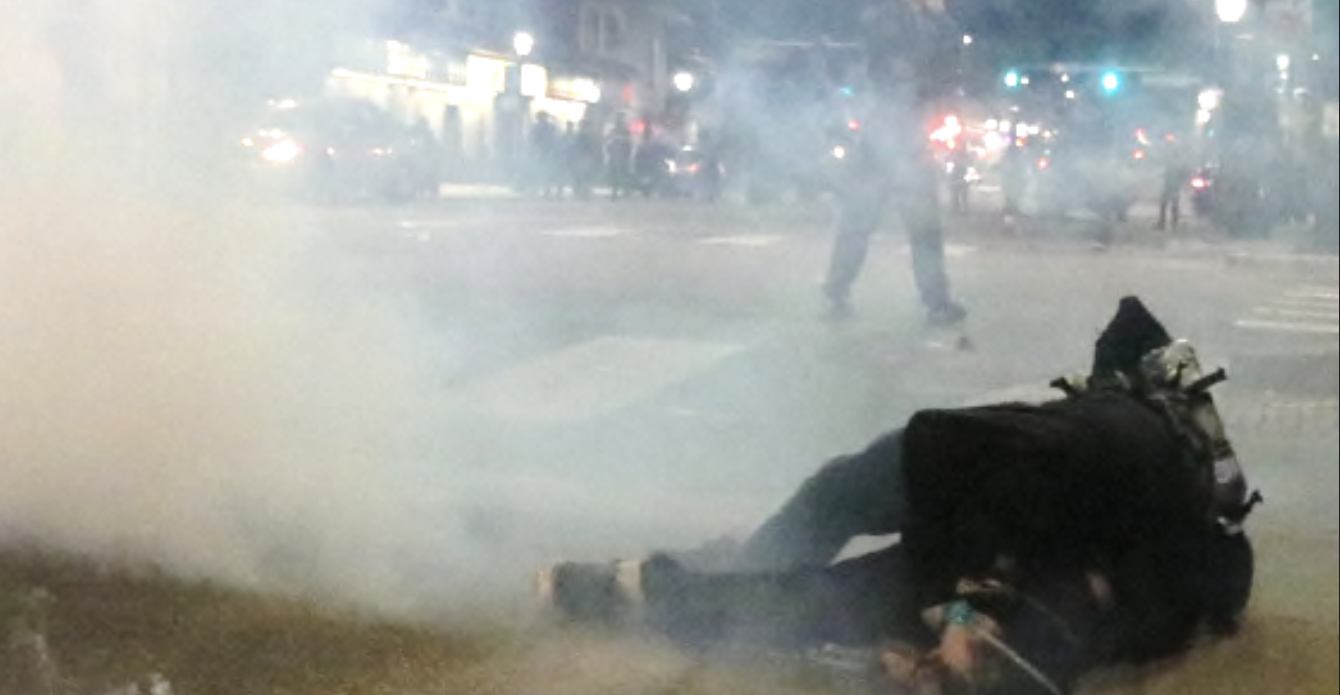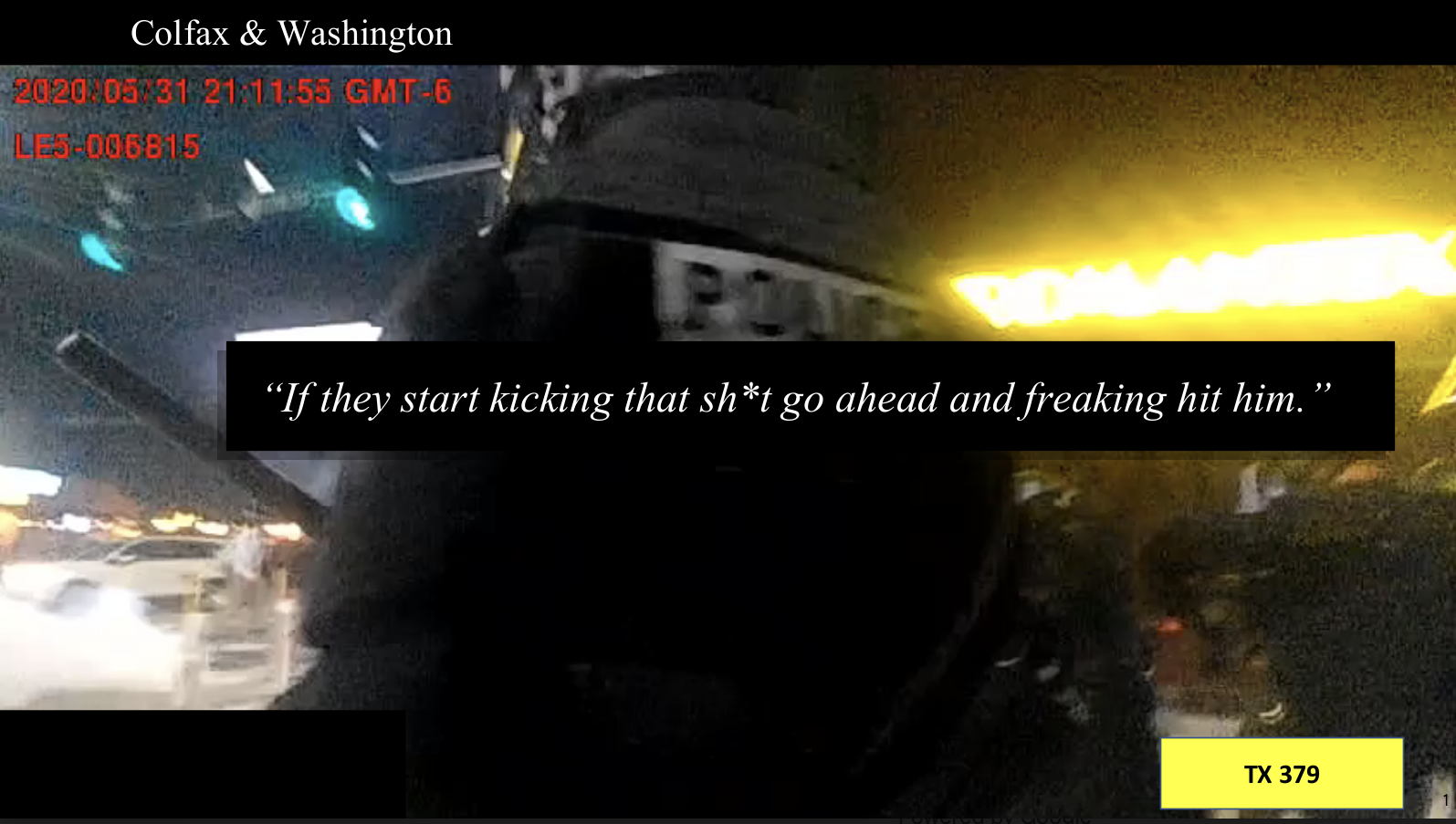
ACLU of Colorado

Audio By Carbonatix
“We shouldn’t be here,” says Tim Macdonald, legal director for the American Civil Liberties Union of Colorado.
Sure, the ACLU litigation leader is happy about finally getting the chance to hold Aurora and its police officers accountable for their actions on May 31, 2020, during the George Floyd protests in downtown Denver – following a recent ruling by the Court of Appeals for the 10th Circuit – but should things have even gotten this far? Is there a way to stop cities and local cops from acting inappropriately, rather than just pushing them after the fact?
Macdonald and the ACLU believe so.
“Zack Packard shouldn’t have been shot in the head and left with a fractured skull, a brain bleed and fractured discs that have fundamentally transformed his life,” Macdonald says, describing the case of one of two protesters the ACLU is representing against the City of Aurora and three Aurora Police Department officers. “I think the question you ask is the right one: ‘How can we stop this? How can we prevent this from happening?'”
Macdonald believes that there’s only so much the ACLU and other civil rights groups can do to make municipalities and law enforcement pay for their wrongdoings in the Mile High City and elsewhere. A federal jury ordered the City of Denver to pay $14 million in damages to another group of George Floyd protesters who got hit by police with pepper balls and a lead-filled bag; the jury ruled in March 2022 that Denver police used excessive force against the twelve demonstrators and violated their constitutional rights.
But to this day, Macdonald tells Westword, the City of Denver and the cops involved have not admitted any wrongdoing or taken accountability for their actions. Nor have Aurora and its officers.
“The City of Denver is still fighting the $14 million judgment that we got on behalf of the twelve folks who were shot, sprayed and brutalized by the police,” he says. “They have not been open to any of our, I think, thirty-something suggested changes that ought to be made. So you know, that is disconcerting to us, as to whether or not they’re really open to changing that culture or not.”
If there aren’t changes in Denver and Aurora’s culture and leadership tactics, McDonald adds, the lawsuits don’t hold as much weight.
“There are a whole bunch of things that we argued in the Denver case that the police should change,” he notes. “It starts with training; it includes not using less-lethal weapons and chemical munitions on citizens; and it continues with leadership. One of the things we saw from the response by Denver and Aurora and the other jurisdictions that Denver brought in [during the George Floyd protests] was that there was a complete failure of leadership. There was a complete failure of training. You had a sergeant, you know, handing untrained officers grenades being chucked into the crowd. And that’s just some of the footage that we played in the trial, which I think made the jury so upset with the police response. So it is an ‘all of the above’ answer. We need some important fundamental transformations…and this [federal appeals court decision] is a small step toward saying you will be held accountable if you do not have the proper training, the right type of leadership and an ongoing commitment to ensuring that these types of actions are not repeated.”
When Zackary Packard and Johnathan Duran, two plaintiffs in the Aurora case represented by the ACLU and Elizabeth Wang with the civil rights law firm Loevy & Loevy, respectively, arrived in downtown Denver to protest the murder of George Floyd in May 2020, they – like countless other demonstrators – were met with swift resistance from law enforcement. The city’s mayor at the time, Michael Hancock, had declared a state of emergency and called upon police departments and officers from across the metro area to “provide assistance” to Denver police during the demonstrations, according to federal court documents.
Aurora responded. Its idea of assistance: firing beanbag rounds at protesters’ faces and hitting them in the groin with foam batons. Or, as the City of Aurora and cops involved put it, “objectively reasonable” police tactics, according to court documents.
“If they start kicking that shit, go ahead and frickin’ hit ’em,'” said Aurora Police Department Sergeant Patricio Serrant, a defendant in the case, to his officers that night.

An Aurora police sergeant was overheard telling cops on May 31, 2020, to “frickin’ hit ’em” in reference to George Floyd protesters.
ACLU of Colorado
The federal appeals court ruling, which was handed down on November 14 by the 10th Circuit, outlines the events that unfolded in Denver during the May 30 protests, when Packard and Duran’s run-ins with police occurred within a thirty-minute span.
“Packard had been protesting near downtown Denver,” the ruling explains. “A police officer threw a tear gas canister near Packard, which Mr. Packard kicked ‘away from himself and other protesters, in the direction of a line of officers.’ Immediately after kicking the canister, Mr. Packard was hit in the head with a beanbag round fired from a shotgun; the round knocked him unconscious and caused major injuries.”
As noted in court documents, one of the defendants involved – Officer David McNamee – fired several beanbag rounds at Packard, though authorities “dispute” whether he was actually the officer who knocked out the protester. “The district court concluded Plaintiffs raised genuine disputes of material fact as to whether Sergeant Serrant and Officer McNamee were ‘personally involved in the alleged violation of Mr. Packard’s rights,'” the ruling notes.
Before the federal appeal, an argument had been filed with the 10th Circuit by Aurora and its officers, calling into question the district court’s denial of qualified immunity for McNamee, Serrant and Officer Cory Budaj, the third defendant.
“The district court held ‘[t]he law is clearly established that an officer cannot shoot a protester with…less-lethal munitions when that protester is committing no crime more serious than a misdemeanor, not threatening anyone, and not attempting to flee,'” the ruling says. “Because the district court concluded neither Mr. Packard nor Mr. Duran was committing a crime, posing a threat, or attempting to flee, the district court denied qualified immunity to Officers McNamee and Budaj and Sergeant Serrant.”
In Packard’s case, the man had kicked the canister “about five to ten feet away from himself and other protesters,” the ruling states.
“Critically, this action ‘did not pose an immediate threat,’ the district court concluded, ‘because officers were equipped with gas masks that protected them from any gas from that container,'” it adds. “While acknowledging officers may ‘not like protesters kicking gas canisters away,’ the district court held ‘there is no evidence that the kicking of gas canisters generally, or the specific instance of Mr. Packard’s kicking a gas canister, posed an imminent threat to officers or anyone else.'”
Ultimately, the 10th District ruled that the use of less-lethal munitions is “unconstitutionally excessive force when applied to an unthreatening protester who has neither committed a serious offense nor attempted to flee.” Macdonald and the ACLU praised that decision, calling it “precedent-setting.”

Zackary Packard is seen here moments after being shot in the head with a beanbag round fired by police from a shotgun.
ACLU of Colorado
“We think it’s a huge decision,” Macdonald says. “We think it’s really important that the 10th Circuit established and held that not only is it a constitutional violation to use less-lethal munitions on protesters – peaceful protesters – but that the law was clearly established for many, many years that it was a constitutional violation. And I think that is really important for people here in Colorado, and frankly, for people across the country, particularly as we see protests like the Black Lives Matter protests and others nowadays. And now it should be even more clear after this decision that folks can go out, go to the streets, and peacefully protest without being subjected to retaliatory police action. It’s a fundamental right, and these precedents can be established for the benefit of folks not just here in Colorado, but across the country.”
Macdonald hopes that Aurora and Denver will eventually see the ACLU’s side of the issue, but he’s not confident.
“One of the things that is, in some ways, most troubling is the response from the Denver Police Department and the Aurora Police Department, which continues to this day to be that they did nothing wrong, that there were no actions for which they expressed regret, or apology or anything else,” he charges. “And that’s crazy to me as a citizen of this city. Having watched the footage of people being shot while on their knees with their hands up, people being sprayed in the face with chemical munitions while their hands are up, saying, ‘Don’t shoot!’ and for none of the officers – essentially, out of all the actions that went on – essentially no discipline.”
The City of Aurora and City of Denver both declined to respond to Macdonald’s statements, citing pending litigation. A spokesperson for the Denver’s City Attorney’s Office provided information and a list of changes that the DPD “made proactively and in response to the OIM [Office of the Independent Monitor] following the protests.”
The next step in the Aurora case is for a trial date to be set, Macdonald says. The ACLU and other legal counsel involved are also currently waiting on a final judgment to be entered in the Denver case.
“We asked them a year ago to enter final judgment on the Denver verdict,” Macdonald says. “Interestingly, the city also has asked the court to enter judgment on that verdict. They joined our request. Initially, they opposed it; then they joined it. … We’re hoping that the verdict against Denver, the judgment that the jury renders, will be entered so that we can move that case to its conclusion. Then the case against Aurora and its officers can hopefully be set as quickly as possible, so that our clients can move on.”
While he’s upset with Aurora and Denver’s response to the lawsuits, Macdonald says he has hope for the future, especially when it comes to the Mile High City.
“There’s a new administration in Denver, and let’s hope that they’re committed to improving and learning from the mistakes as opposed to digging in and saying, ‘You know, individuals who are shot while peacefully protesting with their hands up, there’s no problem with that, let alone a constitutional violation,'” he concludes. “Just as a moral matter, we should be saying, ‘That’s not appropriate. That’s not permissible. And you know, in our view – and in the view of the court – it’s unconstitutional.”